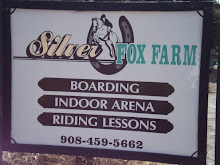In some horse movies, for example Hidalgo, the term "thoroughbred" is incorrectly thrown about as if to mean of pure breeding. Many people make the mistake of thinking if something is not a mutt, it's a 'thoroughbred'. In fact, a Thoroughbred is not just any purebred horse, it is a specific breed of horse. Since it is a specific type, it is a proper noun and should be capitalized in writing, unlike the word "purebred".
The Thoroughbred was developed in the 17th and 18th centuries, with the first pedigrees being tracked and published in the General Studbook in 1791. The breed was selectively bred to produce horses that were fast and athletic for the sport of racing.
Toay the breed is used primarily for racing but they are used in other events, such as jumping, dressage, barrel racing, and eventing. The breed is tall, built for long-distance speed with a lanky build, and is known for being high-strung. They are registered with the American Jockey Club.
Thoroughbreds are sometimes crossed with other breeds to add long-distance racing ability. Quarter Horses crossed with Thoroughbreds can still be registered with the American Quarter Horse Associatioin as "appendix Quarter horses".
A purebred horse, on the other hand, is a horse that has two parents of the same breed and is registered with the appropriate breed registry. There are hundreds of breeds out there-- from Clydesdales to Arabians to Akhal-Tekes.
A horse that is not a purebred is a "cross" if it has two parents of known breeding-- for example, on parent a registered Arabian and one a registered Appaloosa-- and is generally registered. Many breed registries do register crosses, and some crosses may have special names-- ie, "appendix quarter horse" for a TB/QH cross, "arapaloosa" for an Arabian x Appaloosa. Some crosses are sought after for certain events, such as Friesian sporthorse crosses.
A horse of unknown parentage is considered a "grade" horse, or unregistered horse. Generally these horses are of lower value and quality or questionable background, as the horse has no papers showing previous ownership, age, or breeding. It is generally considered unethical in the horse world to be breeding "grade" horses.









No comments:
Post a Comment